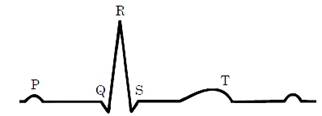Question 1
|
Atrioventricular valves are supported by strands of connective tissue called ______.
endocardium
| |
myocardium
| |
chordae tendineae
| |
cardiac fibers
|
Question 2
|
Which one of the followings refers to blood cancer characterized by uncontrolled proliferation of abnormal/immature white blood cells in the bone marrow?
Hypertension
| |
Atherosclerosis
| |
Leukemia
| |
Pulmonary embolism
|
Question 3
|
Consider the following statements about biomedical technologies:
(a) During open heart surgery blood is circulated in the heart-lung machine
(b) Blockage in coronary arteries is removed by angiography
(c) Computerised Axial Tomography (CAT) shows detailed internal structure as seen in a section of body
(d) X-ray provides clear and detailed images of organs like prostate glands and lungs
Which two of the above statements are correct?
(a) and (b)
| |
(b) and (d)
| |
(c) and (d)
| |
(a) and (c)
|
Question 4
|
Given below is the ECG of a normal human. Which one of its components is correctly interpreted below?


Peak P and Peak R together – systolic and diastolic blood pressures
| |
Peak P – Initiation of left atrial contraction only
| |
Complex QRS – One complete pulse
| |
Peak T – Initiation of total cardiac contraction
|
Question 5
|
Which type of white blood cells are concerned with the release of histamine and the natural anti coagulant heparin?
Monocytes
| |
Neutrophils
| |
Basophils
| |
Eosinophils
|
Question 6
|
What is true about RBCs in humans?
They do not carry CO2 at all
| |
They carry about 20-25 percent of CO2
| |
They transport 99.5 percent of O2
| |
They transport about 80 percent oxygen only and the rest 20 percent of it is transported in dissolved state in blood plasma
|
Question 7
|
If due to some injury the chordae tendinae of the tricuspid valve of the human heart is partially non-functional, what will be the immediate effect?
The flow of blood into the pulmonary artery will be reduced
| |
The flow of blood into the aorta will be slowed down
| |
The pacemaker will stop working
| |
The blood will tend to flow back into the left atrium
|
Question 8
|
The cells lining the blood vessels belong to the category of
Columnar epithelium
| |
Connective tissue
| |
Smooth muscle tissue
| |
Squamous epithelium
|
Question 9
|
In humans, blood passes from the post caval to the diastolic right atrium of heart due to:
Pressure difference between the post caval and atrium
| |
Pushing open of the venous valves
| |
Suction pull
| |
Stimulation of the sino auricular node
|
Question 10
|
The most active phagocytic white blood cells are:
Neutrophils and monocytes
| |
Neutrophils and eosinophils
| |
Lymphocytes and macrophages
| |
Eosinophils and lymphocytes
|
Question 11
|
To obtain a standard ECG, a patient is connected to the machine with three electrodes
One to each wrist and to the left ankle
| |
One to each ankle and to the left wrist
| |
One to each wrist and to the left chest region
| |
One to each ankle and to the left chest region
|
Question 12
|
The blood does not clot inside the body because of :
Oxygenation of blood
| |
Movement of blood
| |
Heparin in blood
| |
Absence of fibrinogen in blood
|
Question 13
|
Which is the correct sequence of arrangement of types of W.B.C. in decreasing order in terms of number per mm3 of human blood?
Eosinophils > Basophils > Neutrophils
| |
Basophils > Eosinophils > Neutrophils
| |
Neutrophils > Eosinophils > Basophils
| |
Eosinophils > Neutrophils > Basophils
|
Question 14
|
The blood calcium level is lowered by the deficiency of:
Calcitonin
| |
Parathormone
| |
Thyroxine
| |
Both Calcitonin and Parathormone
|
Question 15
|
The average diameter of Red Blood Corpuscles of man is
7.2 μm
| |
8.1 μm
| |
9.2 μm
| |
10.3 μm
|

No comments:
Post a Comment
I am Nursing Aspirant Follow me and Join MCI For excellency in competitive Exams